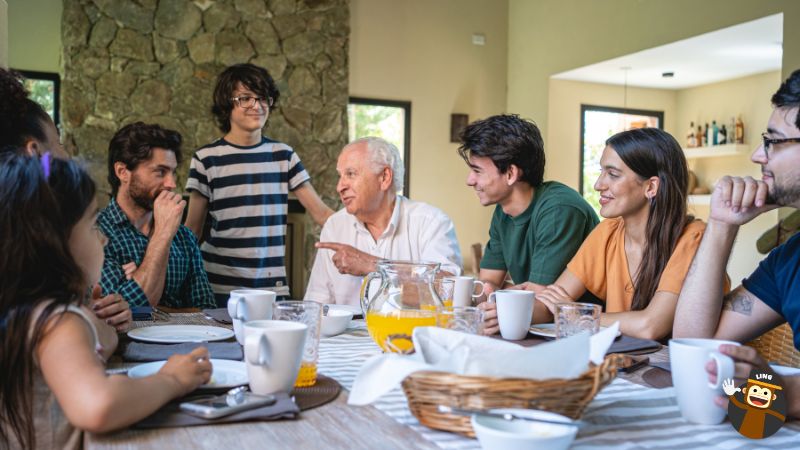Are you visiting a friend in Germany? Have you met a special German someone and they’re introducing you to their family? In either case, that’s exciting, and knowing the German vocabulary for family members will make you stand out.
Thankfully as you’ll see, the German family words sound an awful lot like their English counterparts. This will make the vocabulary easier to remember if you need to introduce your family members, such as a husband or wife, parent, child, or sibling. All right, let’s get going and learn these all-important German words!
German Family Culture
In Germany, family bonds are strong. Virtually everyone you meet will insinuate how fundamentally important family is to them. There is, however, a distinction between immediate and extended relations. Direct relatives tend to have much stronger bonds and support compared to relatives by marriage.
When you meet someone’s family members, you’ll want to start off by introducing yourself in German. Be sure to include the person’s name (if you know it) or address them with something like, it’s lovely to finally meet so and so’s mother.
Family Structure In Germany

Within Germany, the nuclear family remains the most statistically common family structure. However, Germans are also excepting same-sex couples and same-sex families living together.
German people are also rather self-sufficing and independent, so you won’t find entire generations of families living under one roof as you would in some other cultures. Grandparents or elderly parents tend to live on their own.
How To Describe Family In German
In the German culture, there is only one term for family, and it’s the die Familie (the family). See how similar that is to English? Quite a few of the words will sound familiar. For those that look tricky to pronounce, click the blue button to hear the correct pronunciation.
Immediate Family Vocabulary In German

Extended Family Members In German Vocabulary

German Vocabulary For In-laws
German Vocabulary For Step-Family Members
| English | German | Pronunciation |
| Stepfather | der Stiefvater | |
| Stepmother | die Stiefmutter | |
| Stepbrother | der Stiefbruder | |
| Stepsister | die Stiefschwester | |
| Half brother | der Halbbruder | |
| Half sister | die Halbschwester |
Other Family-Related Vocabulary In German
| English | German | Pronunciation |
| Widower | der Witwer | |
| Widow | die Witwe | |
| Single | Single | |
| Married | verheiratet | |
| Divorced | geschieden | |
| Separated | getrennt |
Questions To Ask People About Their Family In German

You may find it useful or polite to ask someone about their family. Remember to only really attempt this with people you know. To inquire about these questions with complete strangers would be considered odd in German culture and off-putting.
Family-Related Questions To Ask Locals
Learn German With Ling

Make sure to bookmark this page to reference German vocabulary for family easily. We also recommend impressing the people you meet by knowing what their name means in German. If you enjoyed this post, we invite you to expand your vocabulary knowledge further by getting a complete German language lesson with our most recommended application.
Learning a complicated language like German can indeed be challenging, especially for total beginners in Germanic languages like Dutch, Swedish, and Danish. But what if there’s one resource that can help you learn this language right away? Well, allow me to introduce to you the Ling App.
The Ling App is a fantastic language resource that has lessons for over 60+ foreign languages. From the inside, you’ll get tons of exercises and lesson units that are all reviewed and developed by a team of real native speakers and language professionals. It also has additional features that will make learning fast and engaging even if you just use it for 10 minutes.
Ready to discover the best way to learn German? Download the Ling App now!



































































